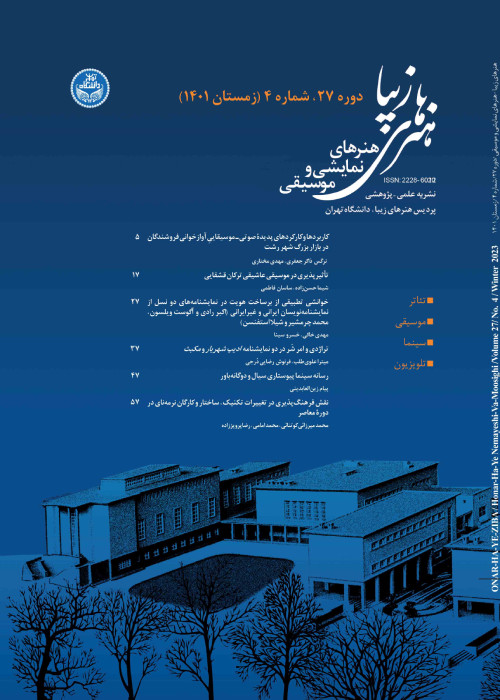The Ghazal-khâni and Its Place in Iranian Musical Culture
Author(s):
Abstract:
Ghazal-khâni, known in the official milieu as kuchebâghi, is a form of free-metered song using poems from the oral tradition, and sometimes even classical poems, sung especially in Tehran and the city of Rey by amateur singers who belong, in most cases, to a particular socio-cultural class. The place of this vocal genre in official Iranian culture is influenced by the status of its singers, who belong to a social class with more or less deep religious tendencies, but also have features deemed suspect according to ethical and social norms. This socio-cultural class, which inhabits the south of the socially polarized contemporary city of Tehran, and whose members are known as dâsh, dâsh mashdi, gardan koloft, jâhel, etc., has always had two opposing characteristics, oscillating between generosity and honesty, on one hand, and malfeasance, on the other, and has provoked sometimes respect and sometimes hate, but has always been the object of societys suspicions. In fact, like the free-metered châhârpâre-khâni in different regions of Iran, ghazal-khâni is a kind of chanting of poems, which is, due to its links with the countrys poetic tradition, a sign of 'high culture' within a popular milieu, and therefore a source of prestige, at least for the gardan kolofts of good reputation who practice it. This form of song is also called bâbâ shamali, lâti (from lât = thug) and, since the 1940s, bayât-e Tehrân. It is sung a cappella and has didactic and religious texts. The performance of this kind of song obeys particular rules and was formerly sometimes part of a musical spar between the dâshesin cafes. It is an urban folk music, which shares its musical system with that of Iranian classical music, using the same modes. Yet it is more restricted than its classical counterparts and does not exploit all modal possibilities of this common system, but merely a few modes, particularly the Segâh, the Dashti, and the Homâyun. In performance, the singer does not use the complicated techniques and the melisma of classical singing, which is a kind of very fast yodel, so this singing is much simpler and lacks sophistication compared to its classical counterpart. Ghazal-khâni follows a particular form with regard to the order of the poems that are sung in every session. In fact, it is a suite with a defined order of pieces. The singer first sings one or two quatrains and then the main poem, which can be in the form of ghazal,but also, despite the genres name, in different forms of mosammat,particularly mokhammas and mosaddas. At the end, he concludes with another quatrain. The official milieu has poor knowledge about this form of song and was always misled regarding the content of its poems and its singing style. It has always confused this kind of song with the repertoire of the motrebs, which always contained satirical and comic poems, the quality completely absent from the poems of ghazal-khâni, because its content is very serious and sometimes even religious.
Keywords:
Ghazal , Châhârpâre , Dâsh Mashdi , Kuchebâghi , Bayât , e Tehrân
Language:
Persian
Published:
Honar-Ha-Ye-Ziba: Honar-Ha-Ye Mosighi Va Namayeshi, Volume:21 Issue: 54, 2016
Pages:
69 to 76
magiran.com/p1623686
دانلود و مطالعه متن این مقاله با یکی از روشهای زیر امکان پذیر است:
اشتراک شخصی
با عضویت و پرداخت آنلاین حق اشتراک یکساله به مبلغ 1,390,000ريال میتوانید 70 عنوان مطلب دانلود کنید!
اشتراک سازمانی
به کتابخانه دانشگاه یا محل کار خود پیشنهاد کنید تا اشتراک سازمانی این پایگاه را برای دسترسی نامحدود همه کاربران به متن مطالب تهیه نمایند!
توجه!
- حق عضویت دریافتی صرف حمایت از نشریات عضو و نگهداری، تکمیل و توسعه مگیران میشود.
- پرداخت حق اشتراک و دانلود مقالات اجازه بازنشر آن در سایر رسانههای چاپی و دیجیتال را به کاربر نمیدهد.
In order to view content subscription is required
Personal subscription
Subscribe magiran.com for 70 € euros via PayPal and download 70 articles during a year.
Organization subscription
Please contact us to subscribe your university or library for unlimited access!


